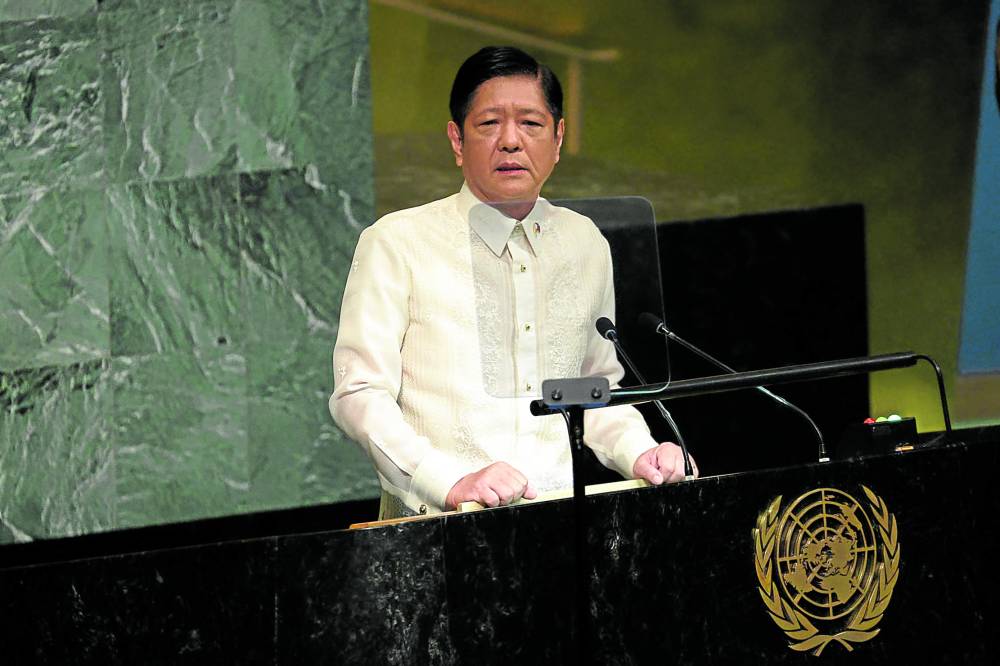Funding our quest for food security
President Marcos addressing the United Nations General Assembly in New York on Sept. 20. —REUTERS.
I had the great opportunity to host the Philippine economic briefing in New York with President Marcos as keynote speaker, and moderate the panel with economic managers Finance Secretary Benjamin Diokno, Budget Secretary Amenah Pangandaman, Socioeconomic Planning Secretary Arsenio Balisacan and Bangko Sentral ng Pilipinas Governor Felipe Medalla, plus Jaime Augusto Zobel de Ayala for the private sector.
The economic priorities of the present administration were discussed, with education, infrastructure, health, social welfare and agriculture as the top five. What stands out for me is the inclusion of agriculture in the top five for the first time. Improving the agricultural sector is usually a grand campaign promise that is forgotten once a politician is seated, so it was refreshing to see the changes being made to improve productivity in this sector.
External headwinds
The fact that there is global threat to food security due to the Russia-Ukraine conflict and climate change has imposed a sense of urgency in the nation’s becoming self sufficient in terms of food. However, we have much to do.
The Philippines’ rice imports from January to August reached 2.719 million metric tons (MT) and is poised to surpass the 2.777 million MT it imported in 2021. The latest data from the Bureau of Plant Industry showed that the country’s rice import volume during the eight-month period was about 64 percent higher than the 1.66 million MT recorded a year ago.
The value of the country’s agricultural output in the first half contracted by 0.4 percent, mainly due to the anemic performance of the crops and fisheries subsectors. Data released by the Philippine Statistical Authority also showed that the value of farm output in January to June (at constant 2018 prices) reached P853.09 billion, lower than last year’s P856.66 billion.
Article continues after this advertisementHopefully, the commitment of the President and the support from the Department of Budget and Management (DBM) will jump-start the changes needed in this sector.
Article continues after this advertisementPencil pushing
The President has acknowledged the agricultural sector as a main driver in the country’s push for growth and employment. In response, the DBM, led by Pangandaman increased the budget of the agriculture sector by an unprecedented 39.2 percent to P184.1 billion. Of course, Congress will still have to approve this but that is the number presented in the National Expenditure Program for 2023.
In anticipation of threats to food security, the buffer stock for rice has been increased from nine days to 15 days, with an allocation of P12 billion for the buffer stocking program of the National Food Authority to procure 631.579 million MT of palay from local farmers (note the emphasis on local!). There is also an allocation of almost P670 million for the purchase of high-quality rice and corn seeds for seed buffer stocking under the Department of Agriculture (DA) to ensure that there is enough supply of seeds in case of calamities and emergencies affecting rice and corn production.
For the long term, there is also infrastructure development for agricultural growth: P13.1 billion was earmarked for the construction, rehabilitation and repair of farm-to-market roads across the country and P500 million for farm-to-mill roads, to specifically improve linkages to sugarcane plantations. There is also P29.5 billion for irrigation services of the National Irrigation Authority, on top of the small irrigation projects of the DA.
For the long-term development of the agricultural sector, the National Rice Program has been allocated P30.5 billion for 2023, doubled from P15.8 billion in 2022. The Rice Competitiveness Enhancement Fund will receive P10 billion, with half of this budget dedicated to farm mechanization and the rest for rice seed development, propagation and promotion (30 percent), expanded credit assistance (10 percent) and rice extension services (10 percent).
More support
Production for other agricultural commodities has also been given support: P5.2 billion for corn; P5.2 billion for livestock; P5.5 billion for fisheries; and P2 billion for high-value crops. There is also P296 million for the implementation of the Dairy Industry Development program of the National Dairy Authority to produce 25.14 million liters of milk, among other targets; and the Philippine Coconut Authority will receive a subsidy of P820 million for the development of the coconut and palm oil industry.
For the agriculture and fisheries sector, P5.9 billion has been apportioned for the construction of agricultural facilities and the procurement of machineries, including on-farm and postharvest facilities/equipment.
There is also P1.7 billion for the Agricultural Competitiveness Enhancement Fund, which will provide credit to individual farmers or fisherfolk, farmer and fisherfolk associations and cooperatives and micro and small-scale enterprises, among other support. The Agricultural Credit Policy Council will also receive P2.8 billion to extend affordable and accessible credit to farmers and fisherfolk. Another P4.5 billion has been allocated for the Crop Insurance Program to continue supporting the over 2 million farmers and fisherfolk listed on the Registry System for Basic Sectors in Agriculture. Finally, another P1.8 billion has been allocated for the Special Area for Agricultural Development Project, which involves production and livelihood interventions, as well as marketing assistance and enterprise development.
All these numbers are in the President’s budget message that was presented to Congress. With all this support, if there is no improvement in the agriculture sector by this time next year, we will really have to scratch our heads. Once this budget is approved by Congress, the ball would then be with the DA, as well as its attached agencies and corporations, to ensure that we transform from being an import-dependent nation to one that can truly claim food security. INQ
